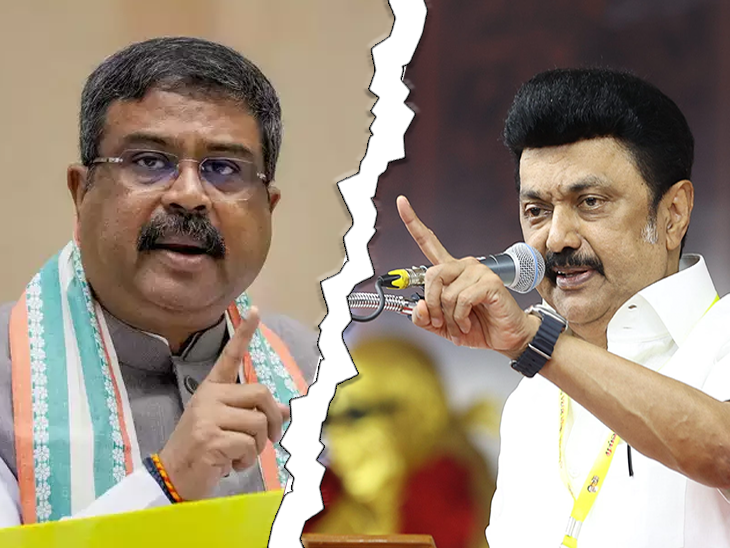- Hindi news
- Career
- Conflict between the center and tamil nadu government on 3 language policy
2 minutes ago
- Copy link

Under the National Education Policy, there is a fierce fierce in the Central Government and the Tamil Nadu government on the rule of teaching 3 languages in schools. On Sunday 16 February 2025, Tamil Nadu CM M.K. Stalin accused the Center of blackmailing and threatening for not implementing 3 language policy. Also, the Hindi language was accused of imposing and not issuing funds.
In response, Union Education Minister Dharmendra Pradhan said on February 17, 2025 that the Central Government is fully committed to implementing the National Education Policy (NEP), 2020.
In fact, on 15 February, Union Minister Pradhan in Varanasi had said in a press conference that Tamil Nadu would have to walk according to the Indian Constitution and is part of the three language policy law. Until Tamil Nadu accepts the policy of three languages, the state will not get education related funds from the Center.

Union Education Minister Dharmendra Pradhan commented that the Tamil Nadu government is against the National Education Policy and Three Language Formula.
After this, Tamil Nadu Chief Minister M.K. Stalin said on Sunday 16 February 2025 that Tamil people would not bear blackmailing or threatening. If the state is denied the fund of overall education, the Center would face strong opposition from ‘Tamils Unique Nature’ i.e. Tamils.

Under NEP 2020, students must learn 3 languages, but no language has been made mandatory. States and schools have the freedom to decide which 3 languages they want to teach.
It has been recommended to study in primary classes (class 1 to 5) in mother tongue or local language. At the same time, it is mandatory to study 3 languages in middle classes (class 6 to 10). It will be English or a modern Indian language in a non-Hindi speaking state. If the second and 12th school wants to give foreign language as an alternative.
Hindi second language among non-Hindi speaking states
The emphasis is on studying classes up to 5th and where possible in the mother tongue, local or regional language. At the same time, Hindi can be taught as a second language in non-Hindi speaking states. Also, in Hindi speaking states, there may be another Indian language (eg Tamil, Bengali, Telugu etc.) as a second language.
It is not mandatory to adopt a language
States and schools have the freedom to decide which three languages they will teach. There is no provision to impose any language compulsorily.
2 language formula is applicable in Tamil Nadu
Tamil Nadu already has a 2 language formula in force. The first language is Tamil (mother tongue/state language) and second language English (for official and international communication). The Tamil Nadu government says that this model is successful and there is no need to put additional language burden on students.

The Tamil Nadu government argues that this protest is necessary to preserve their language and culture. Students should be excellent in English and Tamil and the third language burden is unnecessary. (File photo of Tamil Nadu Chief Minister MK Stalin)
The Tamil Nadu government says that the new education policy is an attempt by the Central Government to impose Hindi 3 language formula. There is no need to change the 2 language formula of the state. Saying this, both the Chief Minister of the state and the Minister of Education have rejected 3 language formula of NEP 2020.
History of opposition Hindi in Tamil Nadu 85 years old
During the British rule in 1937, there was an attempt to make Hindi compulsory in schools in Madras Presidency (now Tamil Nadu), which had to face widespread opposition. This movement was led by Dravidar Kazhagam and later Dravida Munnetra Kazhagam i.e. DMK. The protest was so strong that Hindi had to be removed from schools in 1940.
Similarly, when the Central Government planned to make Hindi the only official language in the country, there were mass protests in Tamil Nadu. Many students lost their lives during these demonstrations and the movement shook the entire state. Subsequently, the central government had to retreat and English was maintained as a co-official language with Hindi.
New education policy brought on 2020 after 34 years
The new education policy was approved by the Government of India on July 29, 2020 on 2020 (NEP 2020). This is a major change in India’s education policy after 34 years. The previous policy was made in 1986 (which was updated in 1992). Its purpose is to mold India’s education system according to the needs of the 21st century, so that students not only pass the exam, but are equipped with practical knowledge and skills.
This time the Center has set a target of 2030 to implement the new education policy. Since education is the subject of concurrent list in the Constitution, which has the right to both the state and the central government. Therefore, it is not necessary that the state governments apply it completely. Whenever there is a conflict situation, both sides have been suggested to solve it with consensus.

